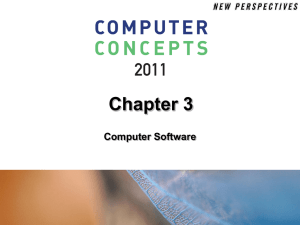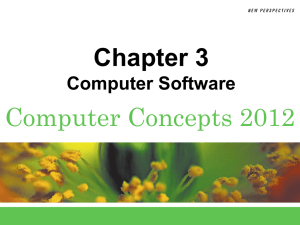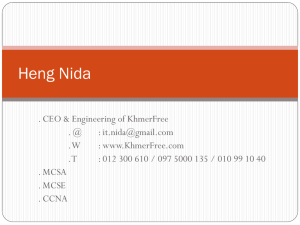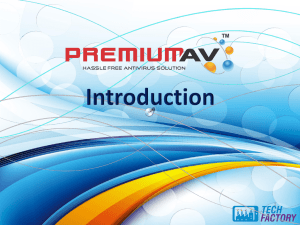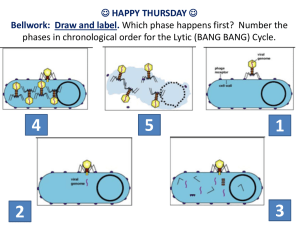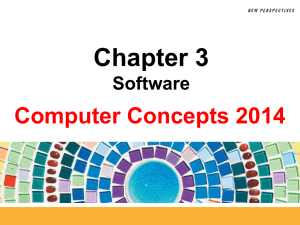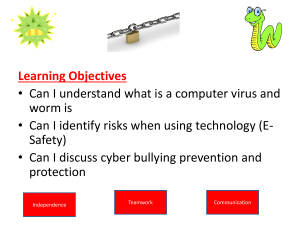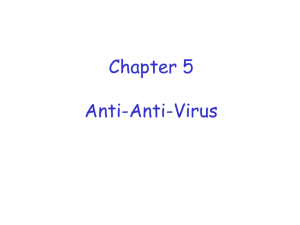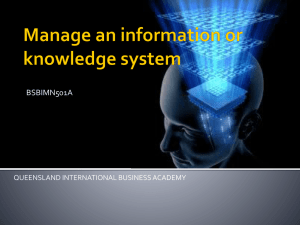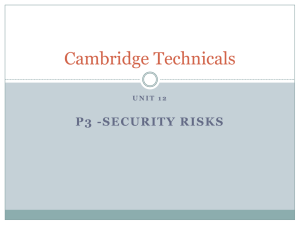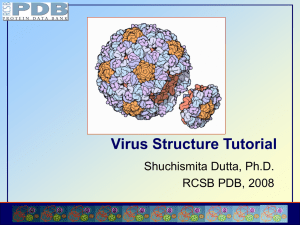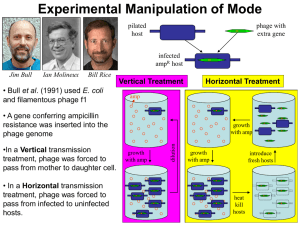Chapter 3A,B,C
advertisement
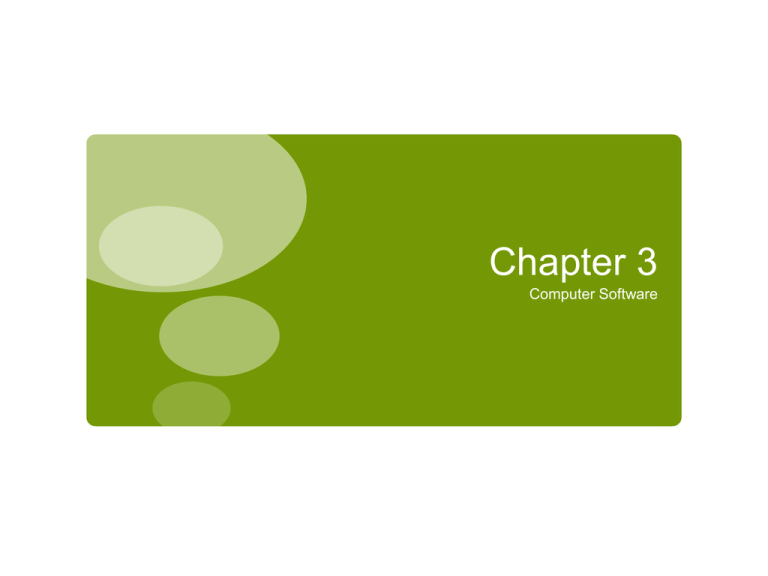
Chapter 3 Computer Software 2 Chapter Contents Section A: Software Basics Section B: Popular Applications Section C: Buying Software Section D: Installing Software and Upgrades Section E: Security Software Chapter 3: Computer Software 3 Software Basics Software Categories Application Software Utility Software Device Drivers Chapter 3: Computer Software 4 Software Categories Chapter 3: Computer Software 5 Application Software Productivity software can be defined as any type of application software that has the potential to help people do their work more efficiently Groupware is designed to help several people collaborate on a single project using local networks or Internet connections Chapter 3: Computer Software 6 Utility Software Utility software (a type of system software) is designed to help you monitor and configure settings for your computer system equipment, the operating system, or application software A desktop widget is a specialized utility program that appears on a computer’s screen-based desktop Chapter 3: Computer Software 7 Device Drivers A device driver is software that helps a peripheral device establish communication with a computer Windows Device Manager Chapter 3: Computer Software 8 Popular Applications Document Production Software Spreadsheet Software “Number Crunching” Software Database Software Graphics Software Chapter 3: Computer Software 9 Popular Applications Music Software Video Editing and DVD Authoring Software Educational and Reference Software Entertainment Software Business Software Chapter 3: Computer Software 10 Question Just about everyone has used iTunes software to download music. iTunes software also allows you to list the songs you’ve downloaded, delete songs, find songs, and organize your music into play lists. These features of iTunes are similar to what type of software? A. Word processing software B. Spreadsheet software C. Database software D. Groupware Chapter 3: Computer Software 11 Document Production Software Assists you with composing, editing, designing, printing, and electronically publishing documents Word processing Desktop publishing Web authoring Chapter 3: Computer Software 12 Document Production Software Chapter 3: Computer Software 13 Document Production Software Document production software may include: Spelling checker Thesaurus Grammar checker Feature to analyze the reading level Spelling dictionary Readability formula Search and Replace feature Chapter 3: Computer Software 14 Document Production Software The format for a document refers to the way that all elements are arranged on the page Chapter 3: Computer Software 15 Document Production Software Chapter 3: Computer Software 16 Document Production Software Chapter 3: Computer Software 17 Document Production Software Mail merge automatically creates personalized letters by combining the information in a mailing list with a form letter Additional capabilities of word processing software include: Automatically generating table of contents and index Numbering and positioning footnotes Providing document templates and document wizards Exporting to HTML format Chapter 3: Computer Software 18 Spreadsheet Software A spreadsheet uses rows and columns of numbers to create a model or representation of a real solution Spreadsheet software, such as Microsoft Excel, iWork Numbers, or OpenOffice Calc, provides tools for creating electronic spreadsheets Chapter 3: Computer Software 19 Spreadsheet Software When a cell contains a formula, it displays the result of the formula rather than the formula itself. To view and edit the formula, you use the Formula bar. Chapter 3: Computer Software 20 Spreadsheet Software A formula tells the computer how to use the contents of cells in calculations Cell references Relative reference Absolute reference Mathematical operators Functions Automatic recalculations Chapter 3: Computer Software 21 Spreadsheet Software As shown in the examples, relative references within a formula can change when you change the sequence of a worksheet’s rows and columns. An absolute reference is anchored so that it always refers to a specific cell. Chapter 3: Computer Software 22 “Number Crunching” Software Provides a structured environment dedicated to a particular number crunching task Statistical software Mathematical modeling software Money management software Personal finance software Tax preparation software Chapter 3: Computer Software 23 Database Software A database is a collection of data Database software helps you enter, find, organize, update, and report information stored in a database Chapter 3: Computer Software 24 Database Software Database software provides tools for specifying fields for a series of records. Chapter 3: Computer Software 25 Database Software A query language such as SQL (Structured Query Language) provides a set of commands for locating and manipulating data Natural language query Query by example Chapter 3: Computer Software 26 Graphics Software Designed to help you create, manipulate, and print graphics Paint software Photo editing software Drawing software 3-D graphics software CAD software Presentation software Chapter 3: Computer Software 27 Graphics Software A computer-based presentation consists of a series of slides, created with presentation software. Chapter 3: Computer Software 28 Music Software Allows you to make your own digital voice and music recordings Audio editing software CD ripper software Audio encoding software Ear training software Notation software Computer-aided music software MIDI sequencing software Chapter 3: Computer Software Video Editing and DVD Authoring Software Provides a set of tools for Transferring video footage from a camcorder to a computer Clipping out unwanted footage Assembling video segments Adding special visual effects Adding a sound track DVD authoring software creates DVDs with Hollywood-style menus Chapter 3: Computer Software 29 30 Educational and Reference Software Educational software Helps you learn and practice new skills Reference software Provides a collection of information and a way to access that information Generally shipped on CD or DVD, or accessed on the Web Chapter 3: Computer Software 31 Entertainment Software Computer games are the most popular type of entertainment software Role-playing Action Adventure Puzzle Simulation Sports Strategy Chapter 3: Computer Software 32 Business Software Vertical market software is designed to automate specialized tasks in a specific market or business Horizontal market software is generic software that just about any type of business can use Payroll software Accounting software Project management software Chapter 3: Computer Software 33 Buying Software Consumer Basics Software Copyrights and Licenses Chapter 3: Computer Software 34 Question Suppose you purchase a new computer and it comes with Microsoft Office installed. After using this software for 30 days, it displays a message indicating that to keep using it, you will have to pay. This software is an example of all of the following EXCEPT: A. Proprietary software B. Open source software C. Commercial software D. Demo-ware Chapter 3: Computer Software 35 Consumer Basics Most operating systems include a handful of small applications and a good variety of useful utility software Chapter 3: Computer Software 36 Consumer Basics A software suite is a collection of application software sold as a single package Chapter 3: Computer Software 37 Consumer Basics Available in many types of stores Software contained on distribution media Make sure your computer meets the system requirements Chapter 3: Computer Software 38 Software Copyrights and Licenses A copyright is a form of legal protection that grants the author of an original “work” exclusive rights Copyright notice Software licenses, also called license agreements, define the ways in which you may use a computer program Single-user Site Multiple-user Concurrent Shrink-wrap Chapter 3: Computer Software 39 Software Copyrights and Licenses EULA (End-User License Agreement) Different types of software licenses Public domain Proprietary Commercial software Demo-ware Shareware Freeware Open source BSD GPL Chapter 3: Computer Software FastPoll True/False Questions Answer A for True and B for False Word processing software and operating systems are examples of application software. Spreadsheets are classified as utility software. The software you install to help a printer communicate with a computer is called a device driver. Desktop publishing software is based on frames. Spreadsheet software is particularly useful for what-if analyses. Chapter 3: Computer Software 40 FastPoll True/False Questions Answer A for True and B for False Database software stores information in HTML codes. CAD software is a good choice for professional-quality photo editing. Payroll software is a good example of vertical market business software. If the main screen of a software product does not contain a copyright notice, it is legal to make copies and share them with your friends. A EULA is a license agreement that specifies how to legally use a software product. Chapter 3: Computer Software 41 FastPoll True/False Questions Answer A for True and B for False Open source software is public domain. The Windows Registry is a database that keeps track of a computer’s peripheral devices, software, preferences, and settings. Downloaded software is usually zipped to decrease download time. Hash codes are used to generate a unique number as part of the software activation process. Chapter 3: Computer Software 42 43 Installing Software and Upgrades Installation Basics Installing Local Applications Installing Portable Software and Web Apps Software Updates Uninstalling Software Chapter 3: Computer Software 44 Installation Basics Software installation is a process that places a program into a computer so that it can be run or executed Chapter 3: Computer Software 45 Installing Local Applications Chapter 3: Computer Software 46 Installing Local Applications Chapter 3: Computer Software Installing Portable Software and Web Apps Portable software is designed to run from removable storage, such as a CD or USB flash drive Installation is simply a matter of getting program files to the media on which they are supposed to run A Web application, or Web App, is software that is accessed with a Web browser May require client-side program to be installed Chapter 3: Computer Software 47 48 Software Updates Software publishers regularly update their software Add new features Fix bugs Update security Software patches replace part of the software you currently have installed Service packs correct problems and address security vulnerabilities Chapter 3: Computer Software 49 Software Updates Updates are usually available online for registered software Always install patches and service packs when they become available Many software publishers require users to type in a validation code to complete an update Chapter 3: Computer Software 50 Uninstalling Software Uninstall routines delete the software’s files from the various folders on your computer’s hard disk Chapter 3: Computer Software 51 Question Suppose that you’re looking for software to convert a YouTube video into a format you can use with Windows Media Player or iMovie. You don’t want to bother downloading or installing any software on your computer. What should you look for? A. A Web app B. Open source software C. A .zip file D. A portable app Chapter 3: Computer Software 52 Security Software Security Software Basics Security Suites Antivirus Modules Chapter 3: Computer Software 53 Security Software Basics Security software is designed to protect computers from various forms of destructive software and unauthorized intrusions The terms malicious software and malware refer to any computer program designed to surreptitiously enter a computer, gain unauthorized access to data, or disrupt normal processing operations A blended threat describes malware that combines more than one type of malicious program Chapter 3: Computer Software 54 Security Software Basics Computer virus Computer worm - A worm is a program very similar to a virus; it has the ability to selfreplicate and can lead to negative effects on your system. Trojan horse - Another unsavory breed of malicious code are Trojans or Trojan horses, which unlike viruses do not reproduce by infecting other files, nor do they self-replicate like worms. In fact, it is program which disguises itself as a useful program or application. Keylogger Remote Access Trojan (RAT) Bot - A malicious bot is self-propagating malware designed to infect a host and connect back to a central server or servers that act as a command and control (C&C) center for an entire network of compromised devices, or "botnet." With a botnet, attackers can launch broad-based, "remote-control," flood-type attacks against their target(s). Zombie Botnet Spyware - is a type of malware (malicious software) installed on computers that collects information about users without their knowledge. Chapter 3: Computer Software 9 Types of Viruses Common to Computers 55 1. Boot Sector Virus – affects the first sector on a partitioned storage device. 2. Browser Hijacker – hijacks certain browser functions, usually in the form of re-directing the user automatically to particular sites. 3. Direct Action Virus - only comes into action when the file containing the virus is executed. 4. File Infector Virus - takes root in a host file and then begins its operation when the file is executed. 5. Macro Virus -A wide variety of programs, including productivity applications like Microsoft Excel, provide support for Macros – special actions programmed into the document using a specific macro programming language. Unfortunately, this makes it possible for a virus to be hidden inside a seemingly benign document. 6. Multipartite Virus -A virus of this type may spread in multiple ways, and it may take different actions on an infected computer depending on variables, such as the operating system installed or the existence of certain files. 7. Polymorphic Virus - actually mutates over time or after every execution, changing the code used to deliver its payload. Antivirus programs often find viruses by the specific code used. Obscuring or changing the code of a virus can help it avoid detection. 8. Resident Virus - inserts itself into a system’s memory. It then may take any number of actions and run independently of the file that was originally infected. 9. Web Scripting Virus - Displaying online video in your browser, requires the execution of a specific code language that provides both the video itself and the player interface. This code can sometimes be exploited, making it possible for a virus to infect a computer or take actions on a computer through a website; many such cases of virus exist because of code inserted into a site without the webmaster’s knowledge. Chapter 3: Computer Software 56 Security Software Basics What does malware do? Chapter 3: Computer Software 57 Security Software Basics The term rootkit refers to software tools used to conceal malware and backdoors that have been installed on a victim’s computer A virus hoax usually arrives as an e-mail message containing dire warnings about a supposedly new virus on the loose Chapter 3: Computer Software 58 Security Suites A security suite integrates several security modules to protect against the most common types of malware, unauthorized access, and spam A security suite costs less than purchasing standalone security modules Chapter 3: Computer Software 59 Security Suites Chapter 3: Computer Software 60 Antivirus Modules Antivirus software is a type of utility software that looks for and eradicates viruses, Trojan horses, worms, and bots A virus signature is a section of program code, such as a unique series of instructions, that can be used to identify a known malicious program, much as a fingerprint is used to identify an individual Virus signatures and other information that antivirus software uses to identify and eradicate malware is stored in one or more files usually referred to as virus definitions Chapter 3: Computer Software 61 Antivirus Modules Chapter 3: Computer Software 62 Antivirus Modules Most experts recommend that you configure your antivirus software to periodically scan all the files on your computer If, during the scanning process, your virus protection software identifies a virus, worm, Trojan horse, or bot in a file or attachment, it can try to remove the infection, put the file into quarantine, or simply delete the file Chapter 3: Computer Software
